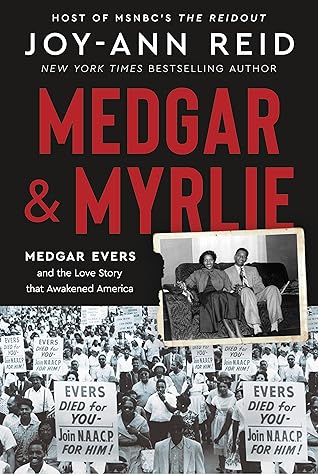More on this book
Kindle Notes & Highlights
by
Joy-Ann Reid
Read between
April 14 - September 1, 2024
Lincoln’s words on the plaque were published in Harper’s Weekly in July 1865, three months after his assassination: “I have been driven many times to my knees by the overwhelming conviction that I had nowhere else to go. My own wisdom, and that of all about me, seemed insufficient for that day.”
In the early morning hours of June 12, 1963, Medgar Evers was shot in the carport of his home in Jackson, Mississippi, by an assassin with links to Mississippi’s White Citizens’ Council and the Ku Klux Klan. Medgar was just thirty-seven years old. Myrlie, who was only thirty, became the widowed single mother of three young children, and the frightened and despondent but determined author of her martyred husband’s legacy.
The fundamental argument of this book is that Medgar’s activism, from his role in investigating the Emmett Till lynching and other racist murders of Black Mississippians to the boycott movement he orchestrated in Jackson, was the foundation upon which the later efforts by SNCC, CORE, and other organizations were built.
Medgar Evers, with Myrlie as his partner in activism and in life, was doing civil rights work in the single most hostile and dangerous environment in America: Mississippi.
To understand the world, you must first understand a place like Mississippi. —ATTRIBUTED TO NOVELIST WILLIAM FAULKNER
He was a World War II veteran and a human being. Yet the moment he returned to Mississippi he was nothing but a nigger.
MEDGAR, CHARLES, AND THEIR SIBLINGS HAD RECEIVED THE standard education of every Black Southern child—the realization that there were three kinds of white people: the ones who hated you but were too cowardly to do anything about it, the dangerous ones who would kill you just as soon as look at you, and the nice-acting ones who despite their kindness wouldn’t do a damned thing about it.
Slavery in Mississippi and throughout the South had been characterized by forced breeding and relentless sexual violence. Yet the sons and grandsons of the men who built that system, and who fought to defend it during the Civil War, built their postbellum Southern culture around the constant fear that Black men were fixated on raping white women. And even though the South’s defeat at the war’s end failed to stop the raping of Black women, these sons and grandsons of enslavers invented a palliative for their fears: lynching.
BLACKS IN THE SOUTH WERE KEPT FROM THE BALLOT THROUGH A mix of trickery and terrorism—a crucial means of maintaining the status quo. Lynchings often targeted those who expressed a desire to vote. White newspapers published lists of Blacks who appeared before a voter registrar or who became members of the NAACP. Being on those lists could mean getting fired by your white employer, being evicted from your tenant farm, or even having the bank foreclose on your home. And because you had to be a registered voter to serve on a jury, the practice of keeping Blacks from voting served a double purpose.
The planter class was determined to secure white minority rule through an aggressive system of American apartheid. After witnessing the election of Black statewide officials—including two United States senators: Hiram Rhodes Revels (1871) and Blanch Kelso Bruce (elected in 1874 and serving from 1875 to 1881), plus a Black lieutenant governor, Alexander K. Davis (1873–187633), which made Mississippi, ironically, a model of Reconstruction—Mississippi’s white Democrats vowed to beat back racial progress by any means necessary. When Reconstruction collapsed in the 1877 compromise made on the backs
...more
Medgar’s service in the Army was one of the driving forces that compelled him to do something about prejudice and racism in the country where he was born, in the country he served that treated him just one step above slavery.”
You can’t separate peace from freedom because no one can be at peace unless he has his freedom. —MALCOLM X
Freedom is never granted; it is won. —A. PHILIP RANDOLPH
A knowledge of how to live was a knowledge of how to die. —RICHARD WRIGHT


